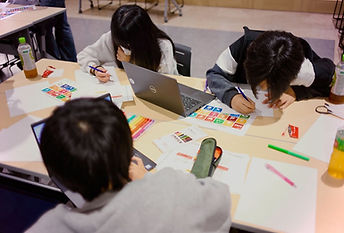OUR PROGRAMS

To empower children in care homes through self-discovery and independence, we offer Inquiry Sessions as part of our self-discovery program, and Discovery Days and Camps as part of our independence-building programs.

Programs in Detail
Inquiry Sessions
Inquiry sessions are held on a weekly, bi-weekly, or monthly basis—depending on the orphanage—and are centered around project-based learning.
Elementary school children take on projects which allow them simulate various careers, allowing them to explore real-world topics through experiential learning. This includes projects such as being a politician advocating for environmental conservation, and making a call to action video.
The middle school and high school students engage in an experience of building passion project, where they combine their personal hobbies or a strength with a world issue that they care about. Through the passion project, they develop a sense of purpose and agency, realizing that their ideas and actions can make a real difference in the world.
.jpg)



Spring and Summer Camp
Spring & Summer Camps are two-day programs held at the end of each semester, designed as a celebration of learning and growth. These camps provide children with a platform to present the projects they have worked on throughout the term—sharing their progress with their friends from other care homes, sponsors, and volunteers.
On the first day, the camp takes place at an international school, where children proudly showcase their projects, giving corporate volunteers a unique opportunity to witness firsthand the impact of their support. The second day is a fun and meaningful excursion, chosen by the children themselves and connected to the theme of their learning unit.
Discovery Day
Discovery Days allow children to design their own trips related to the topic they are investigating during the inquiry sessions. Each orphanage uses a rotation method to research, plan, and decide on a trip that children from different homes will embark on together. This collaborative planning process empowers the children by providing them with agency in co-designing the program.

Approach
Our approach for the GIP follows utilizing two main tools, which are the five life skills that are promoted in all of our programs and the learning cycle, which is an important part of the project-based learning the children go through.
Life Skills
Social Skills
The lifeskills of the GIP aim to be addressed throughout the whole 12-year program. All programs and classes are designed to foster the lifeskills that we aim to instill in the children we impact. These are skills that are not only addressed and reflected upon during our weekly classes, but also during the discovery day and spring/summer programs.

Thinking Skills
Improve critical thinking by learning how to evaluate information carefully and make well-informed decisions, as well as reflect on experiences and learn from them to build a balanced and insightful perspective.

Social Skills
Learn how to communicate clearly and work effectively in a team, handle conflicts gently, and build strong cooperation skills that help you get along well with others in both personal and professional settings.

Inquiry Skills
Develop the ability to conduct detailed investigations, ask the right questions, and explore a wide range of topics in order to gain a deeper understanding and extend knowledge across various fields of interest.

Self Management
Strengthening the ability to manage time effectively, organize tasks, set realistic goals, and maintain a healthy balance in life, which is crucial for personal and professional success.
Self-Management

Self Management
Emotional Skills
Enhancing emotional intelligence by developing empathy and compassion, learning to understand and care about others' feelings. Commit to making a positive impact and being open to new perspectives and cultures.
Learning Cycle
The GIP learning cycle is designed as a guidance for the projects the children come up with during our programs. The learning cycle is a key tool that allows the children to come up with fantastic projects, while undertsanding the necessary preparations to a project possible.

Investigation
Students embark on a journey to understand the chosen topic by engaging in thorough research and inquiry. This phase involves gathering information and asking questions to build a solid foundation of knowledge.

